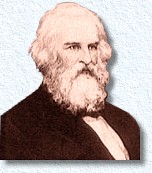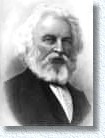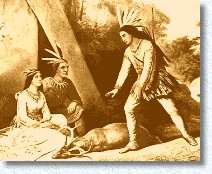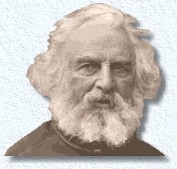 
"Talk not of wasted affection; affection never was wasted."
Henry Wadsworth Longfellow (1807-1882) was an American poet, one of the most popular and celebrated of his time. Born in Portland, Maine, Longfellow received his education at Bowdoin College, where he was a classmate of Nathaniel Hawthorne. After graduating in 1825, he traveled in Europe, returning to teach modern languages at Bowdoin until 1835. In 1836 he began teaching at Harvard University.
After retiring from Harvard in 1854, Longfellow devoted himself almost exclusively to writing poetry. In his words: "Music is the universal language of mankind --
poetry their universal pastime and delight."
Longfellow's work began to gain fame with his first volume of verse, "Voices of the Night", published in 1839. Many of his written words are familiar ... his later works include 'The Wreck of the Hesperus', the well-known 'The Village Blacksmith' and 'Paul Revere's Ride', as well as his narrative poems reflecting American themes: 'Evangeline' (1847), 'The Song of Hiawatha' (1855), and 'The Courtship of Miles Standish' (1858).
 Longfellow's poetry is recognized for its familiar themes, simple ideas, and clear, almost musical language. Despite the fact that many modern critics criticize his work as being overly sentimental, Longfellow has always been one of the most popular of American poets, mainly because of his simple style of writing, and because of his role in popularizing American historical themes. His writings have been described as instrumental in creating a public audience for poetry in the United States. Longfellow's poetry is recognized for its familiar themes, simple ideas, and clear, almost musical language. Despite the fact that many modern critics criticize his work as being overly sentimental, Longfellow has always been one of the most popular of American poets, mainly because of his simple style of writing, and because of his role in popularizing American historical themes. His writings have been described as instrumental in creating a public audience for poetry in the United States.
Perhaps no other American poet has written so much and been so popular. The village smithy under the spreading chestnut tree, the midnight ride of Paul Revere, the Indian prince Hiawatha in his birch canoe ... all these images were created by Longfellow, and became a sort of American mythology.
"Sit in reverie and watch the changing color of the waves
that break upon the idle seashore of the mind".
Henry Wadsworth Longfellow
'The Song of Hiawatha'
 Longfellow's narrative verse 'The Song of Hiawatha' sold 50,000 copies following its release in 1855.
The poem became very popular ... for the first time in literature, Indian themes gained recognition. The appeal of 'Hiawatha' for generations of children has given it a place in literary history. Longfellow's narrative verse 'The Song of Hiawatha' sold 50,000 copies following its release in 1855.
The poem became very popular ... for the first time in literature, Indian themes gained recognition. The appeal of 'Hiawatha' for generations of children has given it a place in literary history.
Hiawatha, a legendary chieftain of the Iroquois, supposedly lived in about 1570. He is credited with having unified the Five Nations of the Iroquois for their protection against the stronger Algonquin people.
According to legend, Hiawatha employed miraculous powers to protect his people from the evil forces of nature. He also instructed the Iroquois in the arts of medicine, agriculture, and navigation.
Part of this epic poem, perhaps the most well-known section, is reproduced at the right. I remember having to memorize these lines in elementary school. Our young and innovative Grade 5 teacher ... Miss Chappus, where are you? ... even had us sing them ... in Iroquois! I also have unpleasant memories of a college course on English literature I took in second year. The course was great, but the weekly seminars were led by an obnoxiously pompous grad student, who proclaimed that there were 'no great American authors or poets'. I didn't have enough self-confidence at that point to tell him he was 'full of it'.
The entire poem, as well as more information about Longfellow, can be downloaded here.
The text is courtesy of The Gutenberg Project, which has as its goal the free dissemination of great works via the internet.
|
"By the shores of Gitche Gumee,
By the shining Big-Sea-Water,
Stood the wigwam of Nokomis,
Daughter of the Moon, Nokomis.
Dark behind it rose the forest,
Rose the black and gloomy pine-trees,
Rose the firs with cones upon them;
Bright before it beat the water,
Beat the clear and sunny water,
Beat the shining Big-Sea-Water.
There the wrinkled old Nokomis
Nursed the little Hiawatha."
From 'The Song of Hiawatha'
by Henry Wadsworth Longfellow
|
We have several other famous pieces by Longfellow, for your reading pleasure. These are considerably shorter works, so you can access them directly on these pages:
 When it became necessary to remove "the spreading chestnut tree" of Brattle Street in Cambridge, England, which Longfellow had written about in his 'Village Blacksmith', the children of that town contributed their pennies to build a chair out of wood from the tree, and gave it to Longfellow. When it became necessary to remove "the spreading chestnut tree" of Brattle Street in Cambridge, England, which Longfellow had written about in his 'Village Blacksmith', the children of that town contributed their pennies to build a chair out of wood from the tree, and gave it to Longfellow.
Henry Wadsworth Longfellow died on March 24, 1882. In 1884, a bust of the author was placed in the Poets' Corner of Westminster Abbey in London, England. He was the first American to be so honored.
"The greatest firmness is the greatest mercy."
Henry Wadsworth Longfellow
Resources
|